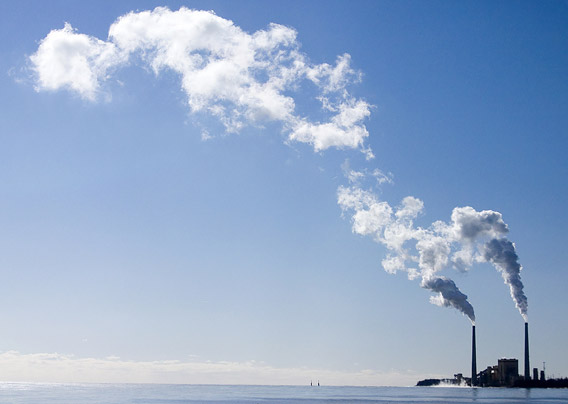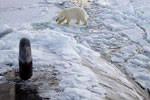
Coal Power Plant on Lake Michigan. Photo by: Bigstock.
A leading journalist and editor at The Atlantic made a startling admission regarding how she writes about climate science last week. Megan McArdle, who not long ago wrote in-depth about documents leaked from Heartland Institute, has noted that as a journalist she depends on her comprehension of climate science on two non-experts and one climatologist who is widely viewed as an outlier for his view that climate change may actually be good for the world.
McArdle writes candidly “I’m not an expert, and I’m not planning to become one. I’ve basically outsourced my opinion on the science to people like Jonathan Adler, Ron Bailey, and Pat Michaels of Cato—all of whom concede that anthropogenic global warming is real, though they may contest the likely extent, or desired remedies.”
First the admission that she has “outsourced” her opinion on anything is a bit bizarre, as if she’s fine with giving up her autonomy. Secondly, that she is “not planning to become one” smacks of a lack of intellectual curiosity about one of the most serious issues facing the world, though I don’t believe that’s the case for McArdle is nothing if not intellectually curious. But these are not the real issues. McArdle deftly outlines the dilemma of journalism—i.e. we “cannot be expert(s) on everything” (in fact we’re really not experts on anything at all, but we are vehicles through which the experts reach an audience)—but it’s her solution that is odd.
“I don’t know what the speed limit should be, how we should redesign the military to counter 21st century threats, or the best way to allocate scarce water resources between competing claims, even though I recognize that in a modern society, these are all the proper concerns of the government; even though I think that these questions are important, I am willing to leave them to experts on traffic patterns, national defense, and water rights. So with global warming.”
I sympathize with McArdle: it’s frustrating to write about things on which your own knowledge is only superficial, and so that’s exactly why we seek out expert opinions—and either quote or paraphrase them. But the problem is McArdle hasn’t left her opinion on climate change to recognized experts, but to a legal professor with an environmental blog (Jonathan Adler), a science editor for a libertarian magazine (Ron Bailey), and a well-known climate change skeptic scientist from the Cato Institute (Pat Michaels), which has been criticized for pushing climate denialism and bad science.
Now I’m not saying the Adler and Bailey are not intelligent individuals with interesting perspectives. But they are not climatologists, they are not even scientists, and for a journalist and editor like McArdle to “outsource” their comprehension of climate scientists on non-experts seems misguided at best. Even though I write about climate science at least once a week, I would by no means described myself as an expert. My expertise lies in communication, as does McArdles, not science, and this is why I seek out scientists—and their work—for my reporting.
Patrick Michaels is another story altogether. He is a climatologist, but his arguments that climate change impacts will be tiny and maybe even good for the world are out-of-step with decades of climate research by thousands of other researchers. Among climatologists, he is a pariah. In addition, it has also been noted that Michaels has been given funding from the fossil fuels energy industry, creating allegations of conflict-of-interest. Michaels may, as well, have an interesting perspective, but his views should be taken within the context of his place in the scientific community and his views as related to the whole. This does not mean journalists should avoid Michaels or his opinion (he has a right to it), but it means that context matters, that as journalists we have a responsibility to weigh the voice of experts based on their reputation, their publications, and the possible “conflicts of interest.” There are biologists today who do not accept the science of evolution, but as a journalist to “outsource” one’s understanding of evolution to a tiny minority view is to do a disservice to our audience.
We like to believe in the fantasy that all scientists agree on the basic principles, because it is “truth.” But that’s simply not the case, one can always find a scientist or expert, i.e. someone with a degree in the subject or who has published widely on it, who disagrees with the consensus. But there is such a thing as the scientific mainstream, i.e. the widely accepted opinions by the vast majority of scientists in that field. In the case of climate science it’s this: yes, the world is warming; yes, human activities are playing a significant role in the current warming; and yes, climate change is going to be very bad for the bulk of society. It’s not going to destroy the world, of course, but, if it’s not mitigated, it will certainly test civilizations and ruin lives starting with the most vulnerable and the most impoverished. Climate change is ultimately an issue about people: what kind of a world do we want to hand off to our children?
Yet, Patrick Michaels’ influence on McArdle is infused throughout her piece, especially when she notes that the “risk of a catastrophic outcome [from climate change] may be small.” The bulk of climate science and nearly all climatologists would say this statement was rubbish. The risk of a catastrophic outcome is actually quite large, especially if we, as McArdle argues fatalistically, do nothing to stop it.
This brings me to my point, which is a short one. Journalists, and the media, in general have begun to treat climate change as if it’s a political debate in which scientists—and science for that matter—don’t really matter. Of course, climate change is a political issue, i.e. how do we deal with this crisis?, but the bedrock first and foremost is the science. It’s the temperature record that shows average worldwide temperatures have risen 0.8 degrees Celsius (1.44 degrees Fahrenheit) since the Industrial Revolution. It’s the physical evidence of diminishing sea ice, vanishing glaciers, species migrations, changes in seasons, more extreme weather, and rising sea levels. It’s the prognostications about what very well could happen if we don’t quickly combat climate change: epic droughts, worsening global conflict, water shortages, swamped islands and coastal areas, and mass extinction. Basically a less secure, more tragic world in which the structures of civilization could begin to breakdown. Some people will call this “alarmist” but this is actually what the vast majority of scientific research shows time-and-again. The impacts of a global nuclear war, as horrific it would be, is not deemed alarmist because people recognize it as an accurate portrayal of a possible future. That has not yet happened in the U.S. with climate change. But if one goes to see the drought-imperiled people of northern Kenya, the swamped cities of Bangladesh, the drought-stricken Amazon forest, or the rapidly melting Arctic the perils of climate change are much, much more real.
McArdler is a compelling writer with always-interesting viewpoints, even if I, myself, rarely agree with her: Ayn Rand is not a personal hero of mine. But I would encourage McArdler before she writes on climate change again to seek more experts on the issue, to listen to their views, and to gather a more comprehensive view of climate science, especially of the anticipated impacts.
Related articles
Tornado season likely to expand due to climate change
(03/06/2012) Last Friday, around a hundred tornadoes left a wake of destruction in the U.S., killing 39 people to date and destroying entire towns. The tragedy hit hardest in Kentucky and Indiana and experts predict the weather-disaster will cost over $1 billion. But isn’t this early for tornado season? Yes, say experts, and climatologists add that while research on tornadoes and climate change is currently in its infancy, it’s possible, probably even likely, that climate change is expanding tornado season in the U.S. due to the earlier arrival of spring.
Birders beware: climate change could push 600 tropical birds into extinction

(02/21/2012) There may be less birds for birders to see in the world as the planet warms. Climate change, in combination with deforestation, could send between 100 and 2,500 tropical birds to extinction before the end of century, according to new research published in Biological Conservation. The wide range depends on the extent of climate and how much habitat is lost, but researchers say the most likely range of extinctions is between 600 and 900 species, meaning about 10-14 percent of tropical birds, excluding migratory species.
Arctic warms to highest level yet as researchers fear tipping points

(02/13/2012) Last year the Arctic, which is warming faster than anywhere else on Earth due to global climate change, experienced its warmest twelve months yet. According to recent data by NASA, average Arctic temperatures in 2011 were 2.28 degrees Celsius (4.1 degrees Fahrenheit) above those recorded from 1951-1980. As the Arctic warms, imperiling its biodiversity and indigenous people, researchers are increasingly concerned that the region will hit climatic tipping points that could severely impact the rest of the world. A recent commentary in Nature Climate Change highlighted a number of tipping points that keep scientists awake at night.
Wall Street Journal climate op-ed: the “equivalent of dentists practicing cardiology”
(02/06/2012) Climate scientists have struck back at the Wall Street Journal after it published an op-ed authored by 16 mostly non-climatologists arguing that global warming was not an urgent concern. The response letter, entitled Check With Climate Scientists for Views on Climate, responds that the Wall Street Journal should seek input on global warming from climate scientists. Six of the 16 authors who published the original article have ties to Exxon Mobil and their professions range from engineers to astronauts. In turn the letter to Wall Street Journal was signed by 38 well-noted climatologists.
Featured video: NASA releases shocking 30 second film on climate
(01/30/2012) NASA has created a new animation showing global temperatures on a map of the Earth from 1880-2011. On the map, blues represent temperatures lower than baseline averages, while reds indicate temperatures higher than the average. As the 131 years pass, the map turns from bluish-white to increasingly yellow and red. Caused by the burning of fossil fuels, deforestation, agricultural practices, and other human impacts, climate change has currently raised temperatures 0.8 degrees Celsius (1.44 degrees Fahrenheit) higher than the Industrial Revolution average.














